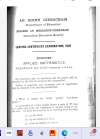Firstly, a warm word of thanks to @Marmie for his research into past LC exam papers.
But note that the fore-attached paper from 1925 is actually an APPLIED MATH paper - not MATH.
The 1925 math paper is
here. I think it's tough enough for its times.
That said, math is evolutional like languages, sciences and humanities. Even the core topics common to those times and now can have different prevailing perspectives in the respective eras. Needless to say, new topics have been added as new math fields emerge or governments are shocked into action on the math curriculum - c.f. the Sputnik Terror causing the "New Math" curricula in the 1960s.
Many of the posts suggest that the LC course under-prepares students considering taking math in university. I accept that such preparation is one consideration. But LC math curricula also need to consider such things as developing a basic understanding of what math actually does, as well as the practical benefits it brings, in the minds of those LC students wanting to pursue non-math studies in university, those going directly to work and those who may need/want to assume caring or management responsibilities in the home. We are all the better off for knowing the importance of our neighbour's skills even if we cannot share them - and vice versa. Naturally this appreciation takes a few years more of real interactive experience to mature in us - but the knowledge underlying it has been lain in at school.
Some people have suggested bringing in an A-Level type system to Ireland. In that way, a student planning to become a doctor/scientist/engineer would drop (or go to pass level?) things like English, Irish, modern/ancient languages, history, economics, etc.
I think such a move would only offer false efficiencies (to the student concerned, to the school timetable and resource management, to the universities, to immediate post-university employers) at the expense of an actual diminution of the true educational level (philosophical as well as vocational) of people across Irish society. While some parents will have lots of books around the house and promote learning of anything for its own sake, many more will not: to the latter, school is just a means to a job. As an eng postgrad in UK I was shocked to find during quizzes that don-level academics were ignorant of major novels and even well-regarded movies. Few of my UK peers had any viable grasp of French or German - a foolish thing in a country so dependent on exports of industrial goods and technology. Few looked beyond their class at school or university for a wife - surely a telling sign of a sense of inadequacy in general conversation. The only ones with some practical skills were those whose fathers were in related trades or had related hobbies.
I think that the smaller a country is the more important it is for us to appreciate the talents and skills of our fellow citizens. A broader education may well add an extra year to a primary degree course and make 1st year Math lecturers work a bit harder. But the societal benefits are well worth this as this broad & comprehensive (academic, practical, physical and cultural) secondary education system is what makes us value and appreciate each other at work and in the community.
By the way, I see old
Jim Simons (of Medallion Funds) was Chair of Math at Stonybrook 1968-1978. This covered the period when the late and great math educator, Prof Donal O'Donovan of TCD, taught there. Both were innovators in math education in universities. This world is at a loss for both their departures.



